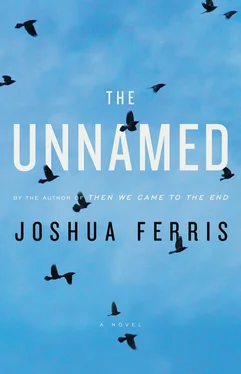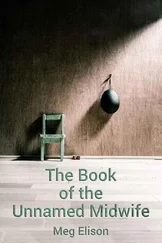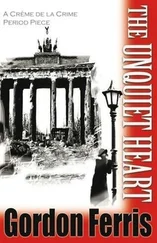Tim rose. “I’ll walk you out.”
“No, sit,” R.H. demanded. “And do not stand until you figure this shit out. I can damn well find my own way out.”
“Twenty million dollars,” said Wodica after R.H. had departed. “I could give two fucks if the man rots in jail or spends the rest of his days eating buffet in Miami, but this firm cannot lose the twenty million a year he brings in on the corporate side.”
“And who the fuck found that money?” asked Tim. “Who the fuck, who the fuck’s client is that? And you two come in here—”
“He asked us to.”
“—and interrogate me? Lecture me?”
“Where have you been, Tim?” cried Kronish. “We lied through our asses just now. Where have you been?”
“And now you’re going to tell me I can’t take a day off?”
“If it were only a day!”
“Goddamn right you can’t take a day off when you’re in the middle of a case like this,” said Wodica. “What’s going on?”
“She’s dying!” he cried. “She’s fucking dying, gentlemen!”
This quieted them momentarily.
Wodica, who was good with transitions, sighed with the right mix of compassion and concern. “Well, that’s a problem,” he said.
“Should you go home if that’s the case?” asked Kronish. “Take a leave of absence?”
“Mike can take over for you,” said Wodica. “Peter will get him up to speed. R.H. will be in good hands with Mike.”
“She doesn’t want me to take a leave of absence,” he said. “It’s very important to her that we preserve the routine. Otherwise the disease wins. That’s what she says.”
Kronish and Wodica exchanged looks.
“Fuck you both,” said Tim. “This is my case.”
He returned to the men’s room. He locked himself in a stall, hung the backpack on the metal hanger affixed to the door, and took a seat on the stool. He untied the laces of his boots with stiff and unhappy fingers and removed two pairs of socks from each foot just as he had done fifteen minutes earlier.
The sight was the same. The little toe on his left foot had mummified. It frightened him no end, how easily it might be snipped off with a pair of scissors and he would feel no pain.
Later in the day it fell off on its own. He felt it moving around inside his sock. He shut the door to his office, removed his boot and retrieved what looked like a giant raisin. He crumpled the toe up in a clean piece of paper and threw it away in a trash bin.
What they used to call soul. What they used to call spirit. Indivisible, complete, that thing made of mind, distinct from body.
He thought he had one — a soul, a spirit, a nature, an essence. He thought his mind was proof of it.
If mood, facial expression, hunger pain, love of color, if everything human and happenstance came not from the soul, the core of self, but from synapses firing and electrical signals, from the stuff in the brain that could be manipulated and X-rayed, what could he say about himself with any degree of certainty? Was mind just body more refined?
He refused to believe that.
He stopped that night at the security post. Frank Novovian leaned against the backrest of his stool, his arms folded over tie and blazer. With his prune-bag eyes he presided over the building’s calm comings and goings. Tim put both forearms on the marble post.
“How did you know about my walking, Frank?” he asked.
Frank unfolded his arms and set his hands on his thighs. He was hesitant. His initial silence seemed to allow him time to work out some internal calculation.
“You don’t remember the girl, Mr. Farnsworth?”
“The girl?”
Frank told him the story. Tim had appeared one day at the security post and asked Frank to follow him out. Frank thought he detected some panic in his voice. What transpired was a preview of the events from a few weeks prior. Frank caught up with Tim halfway across the lower lobby and followed him through one of the revolving doors. It was a hot summer day. Tim turned to Frank and told him that he couldn’t get back to his desk. Frank mistook him to mean he had some pressing engagement and needed someone to convey a message for him or run an errand inside the building, but as they continued to walk and talk, Frank understood that the situation was more complicated. “Help me to stop walking,” Tim said to him. City life swirled around them, car horns, snatches of conversation. Tim asked Frank to grab his arms, tackle him, hold him back somehow. “I’m sorry, Mr. Farnsworth,” said Frank as he tried to keep up. “You can’t stop walking?”
Neither of them saw the little girl. She broke away from her mother and went sidewise straight into Tim. The impact of his leg threw her to the ground. He skittered to avoid stepping on her and had difficulty regaining his balance. Everyone — Frank, the girl’s mother, bystanders — stopped, some to stare, others to bend down to the girl who, after a second of stunned silence, began to wail on the sidewalk. Tim kept walking.
“You looked back at me terrified,” Frank told him. “And I looked at you wondering why you weren’t stopping. I mean, you’d told me you couldn’t stop. I just didn’t understand until then that what you meant was, you really couldn’t stop.”
“I have no memory of this.”
“I remember it like it was yesterday.”
“But we’ve never talked about it.”
Frank shook his head.
“You just believed me?”
“You would have come back to make sure that girl was okay if you could have,” he said.
He had moments of doubt, yet he always returned to the belief that he was sick in body and not in mind. But for whatever reason his memory of knocking that little girl to the ground had been erased. Could anything in his mind — indivisible, complete — be erased, or otherwise go haywire? What confidence did that give him in the permanent thing called the soul?
Tim thanked him and turned to leave. Then he remembered that he had something of Frank’s. He pulled the wool cap out of his coat pocket.
“I owe you a hat,” he said.
Frank took the cap.
“I can’t thank you enough for that. It saved my life.”
“Anytime, Mr. Farnsworth.”
He was prodded awake by a billy club. He sat up in the leather seat and blinked down at the cop, who stood on the blacktop at a defensive angle. He was shining the flashlight in Tim’s eyes. Tim had no idea where he was. The cop asked him to step out of the vehicle. Softer security light streamed through the broad windshield. The steering wheel in front of him was a big round toy. The van or truck had no door. He stepped down the single stair as the cop backed up to keep some distance. There was another cop on the other side of him with his hand at his holster. The three of them stood between the truck he’d slept in and another just like it. It said Utz Potato Chips on the side. A foggy memory of having slipped inside the fenced lot when there was still a little daylight remaining now returned to him.
The cop asked him what he was doing there. He said he didn’t know, which was the undeniable truth, but the cop didn’t care for honest answers.
He had been in the middle of witness prep. There was nothing more important prior to jury selection than readying R.H. for the possibility of putting him on the stand. It would not be without risk but Tim was leaning toward it. He thought it would be good to let the jury hear from the man directly. How many times had R.H. said he had nothing to hide? His protestations of innocence would be genuine, and therefore well received. But it would require damn good coaching. Tim considered it one of the more purely enjoyable aspects of going to trial. He was prepping his witness and loving it. Then he walked out.
Читать дальше












